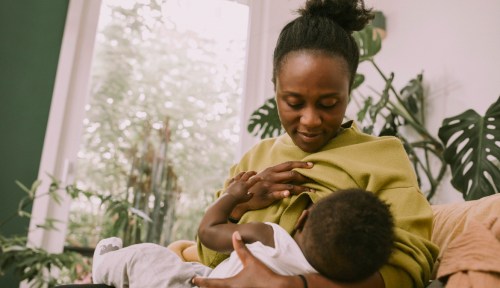Black Women Face Unique Barriers to Breastfeeding—Here’s What I Wish I’d Known
In honor of Black Breastfeeding Week, one writer reflects on the struggles she and many other Black women face with feeding their babies.

Breastfeeding is the hardest thing you’ll do until your child becomes a teenager, said the host of my virtual lactation support group. My heart sank. I was two weeks postpartum and physically exhausted from recovering from an unplanned C-section, learning to care for a tiny, helpless human, and figuring out the surprising complexities of breastfeeding.
Experts in This Article
Ithamar Turenne, RN, is a postpartum nurse at Oula, a maternity care startup based in Manhattan.
Sherry Jones is a birth and postpartum doula based in Los Angeles.
Throughout my pregnancy, I had been intentional about educating myself on all things postpartum, from diapering and bathing a newborn to breastfeeding. As a person who seeks information as a path to comfortability, I wanted to get ahead of whatever learning curve there was to new parenthood. I signed up for webinars, ready with a list of questions pertaining to latching, nipple soreness, and pumping. I read every article with breastfeeding in the title from the countless baby/motherhood/parenting newsletters I subscribed to. I even immersed myself in online forums and picked up the new mom lingo as a FTM, EBF (first-time mom, exclusively breastfeeding).
Despite all that preparation, I still felt like a failure in front of my hungry, hysterically crying baby, and couldn’t help but wonder what had gone wrong. I was lucky in so many ways—my daughter was born healthy, ready to feed just minutes after delivery. But I learned the hard way that no amount of classes and articles could have prepared me for just how challenging breastfeeding can be.
The unique barriers to breastfeeding for Black women
I’m not the only birthing parent who has felt this way about breastfeeding. “From anatomical challenges—such as flat, inverted, or everted-with-stimulation nipples—to engorgement and oversupply, mastitis and milk blebs [blisters on the nipple], breastfeeding is not one size fits all,” says Ithamar Turenne, RN, CBC, a postpartum nurse at Oula, a New York-based modern maternity center. “The media paints a beautiful picture of breastfeeding as a ‘natural’ experience with seamless latching and milk supply. The reality is, that it can be challenging.”
In my case, I experienced a few physical challenges right out of the gate that made breastfeeding tough. I had hoped to wait for a few weeks to start pumping breast milk (in order to establish a breastfeeding routine), but my labor and delivery pediatrician had me pump right away to boost my supply since my baby lost some weight (which is actually normal in newborns). Once I left the hospital, my breasts became massively, painfully engorged with milk as my supply started in earnest. Combine that with nipple soreness from round-the-clock breastfeeding as my baby’s sole source of food, and I was a sobbing mess.
One sleepless night, the thought crossed my mind that I couldn’t remember what my motives were for breastfeeding. The practice felt essential for me—and it is the recommendation of every major American medical organization for the health benefits it confers on parent and baby—but I never stopped to understand my “why,” until these restless moments when everything felt so hard. (The other safe way to feed your baby, of course, is formula—but even that is not necessarily a reliable option anymore in the United States due to the ongoing formula shortage.)
When it came to postpartum care, I was a Black woman with privilege. Yet, I still struggled to make breastfeeding work. What about the women who faced obstacles I didn’t? How would they have a fighting chance?
I would be remiss if I didn’t mention that I’m a Black woman, and Black infants are significantly less likely to be breastfed compared to other racial and ethnic groups. A 2015 study from the Centers for Disease Control and Prevention (CDC) on racial disparities in breastfeeding found that the rate for exclusive breastfeeding at three months for Black infants is 36 percent compared to 53 percent for white infants; at six months, only 17.2 percent of Black infants are exclusively breastfed.
The underlying reason behind these disparities goes beyond individual physical challenges like mine. “Discrimination, trauma, and stress caused by institutions and culturally incompetent and uninformed providers are elements profoundly intertwined that affect success rates of breastfeeding outcomes for BIPOC [Black, Indigenous, people of color],” says Sherry Jones, a birth and postpartum doula based in Los Angeles. “What affects BIPOC the most in their breastfeeding journey is access, regardless of social-economic status or level of education. [It’s knowing] where to go and get the education and hands-on support prenatally and postpartum, and having the financial ability to do so.”
In the throes of my feeding haze, I reached out to a few mom friends who are also Black women. They, too, had faced similar physical challenges as I had, and all of them ended their breastfeeding journey earlier than planned as a result. For many, having to return to work after just six weeks (and sometimes even fewer) made it nearly impossible to establish a breastfeeding routine, much less pump regularly to keep up their supply.
They’re not alone in that predicament: Only 21 percent of U.S. workers have access to paid family leave, and research shows Black women are more likely to have to return to work earlier than other racial and ethnic groups, more commonly dealing with inflexible working hours that don’t support the ability to breastfeed or pump. While federal law requires employers to provide break time for an employee to express breast milk for one year after the child’s birth, women still face limitations by state, as well as discrimination.
When it came to postpartum care, I was a Black woman with privilege. I had access to educate myself on breastfeeding. I also had a supportive partner, and the help of his family members nearby throughout our chaotic fourth trimester. Add in my three-month maternity leave—which is generous by this country’s standards—and savings in the bank to financially keep our household afloat, and I technically wasn’t at a disadvantage. Yet, I still struggled to make breastfeeding work. What about the women who faced obstacles I didn’t? How would they have a fighting chance?
How I was able to make breastfeeding work for me and my daughter
The clarity I gained around my decision to breastfeed presented itself gradually. In another virtual lactation drop-in group meeting, one mom said that my experience would get better and that breastfeeding would improve. My mind couldn’t register that hope at the time, but she was right.
With time and practice, I gained confidence in my ability to breastfeed. But I didn’t do it by myself. I had to create a community to give me the support I needed, starting by enlisting a doula and lactation consultant to help me get the hang of breastfeeding. I also finally found my tribe and built connections with those who shared my struggles in a Black breastfeeding group on Facebook. My efforts were validated when our pediatrician high-fived me for my daughter’s impressive weight gain at her two month check-up. This whole breastfeeding thing was finally working.
Today, I am proudly three months into my breastfeeding adventure. I wish I could say everything was perfect, but every now and then, my baby’s occasional extreme bout with gas or fussiness can impact our feeding session and send me down a worry spiral. The difference is, I’m now gentler with myself and have so much compassion for me and my baby who are still figuring this whole thing out together.
Through this process, I ultimately realized that I chose to breastfeed my child, not because I thought “breast was best,” but because I wanted that particular bonding experience, the natural nutrients for my baby girl, and to be able to say I had given one of the hardest tasks in my life my absolute best, no matter how long my journey lasted. And for as long as it lasts, I’m going to continue to give it my best effort. I just wish every Black mother had that same opportunity.










